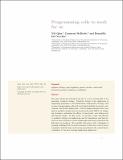Programming Cells to Work for Us
Author(s)
Del Vecchio, Domitilla; Qian, Yili; McBride, Cameron David
DownloadARCRAS_review.pdf (1.457Mb)
OPEN_ACCESS_POLICY
Open Access Policy
Creative Commons Attribution-Noncommercial-Share Alike
Terms of use
Metadata
Show full item recordAbstract
The past decade has witnessed the rise of an exciting new field of engineering: synthetic biology. Synthetic biology is the application of engineering principles to the fundamental components of biology with the aim of programming cells with novel functionalities for utilization in the health, environment, and energy industries. Since its beginnings in the early 2000s, control design principles have been used in synthetic biology to design dynamics, mitigate the effects of uncertainty, and aid modular and layered design. In this review, we provide a basic introduction to synthetic biology, its applications, and its foundations and then describe in more detail how control design approaches have permeated the field since its inception. We conclude with a discussion of pressing challenges in this field that will require new control theory, with the hope of attracting researchers in the control theory community to this exciting engineering area. Keywords: synthetic biology, gene regulation, genetic circuits, control and dynamical systems, robustness, modularity
Date issued
2018-05Department
Massachusetts Institute of Technology. Department of Mechanical EngineeringJournal
Annual Review of Control, Robotics, and Autonomous Systems
Publisher
Annual Reviews
Citation
Qian, Yili, et al. “Programming Cells to Work for Us.” Annual Review of Control, Robotics, and Autonomous Systems, vol. 1, no. 1, May 2018, pp. 411–40.
Version: Author's final manuscript
ISSN
2573-5144